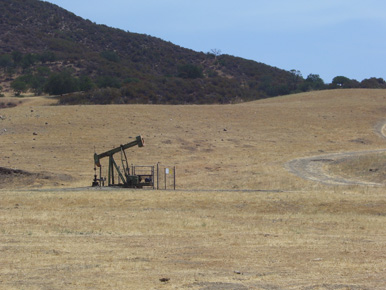
Paso Robles’ Ed Hazard believes the public and politicians haven’t given enough attention to rights of royalty and mineral rights owners in local-level debates like the one in San Benito County over Measure J. Kathy Spencer from the Bitterwater area has another perspective and worries her family members could lose control of their property because an oil company owns mineral rights on 440 acres of their land.
Contrasting views from Hazard and Spencer – about varying levels of property rights – reflect a complicated, often overlooked facet of the debate about enhanced oil recovery in the Monterey Shale.
Discussions over mineral rights have come up because measure supporters have stressed that many local landowners don’t own rights to the minerals such as oil. Separate parties, in fact, can own royalties, mineral rights, surface rights and even air space with condominium units, said Spencer, president of the California chapter of the National Association of Royalty Owners.
Kathy Spencer and her husband Joe are among the residents who own property, but not the mineral rights, in the Bitterwater area. She expressed concern about Citadel Exploration – at the core of the Measure J debate due to its plans for up to 1,000 wells with production from cyclic steaming – and the potential the company might drill on land that has been in her family for more than a century.
Spencer recalled how her father for years would warn the family about prospective oil activity every time gas prices spiked.
“He knew we didn’t have the mineral rights on this,” she said, referring to Standard Oil Company’s long-time ownership of those rights on the Spencer property and others throughout South County. “But I really didn’t realize until we got into this how little rights we have to the surface.”
Hazard is well aware of the difference between mineral and surface rights, and underscored that levels of ownership are clearly stated on deeds recorded when properties change hands. He is an oil and gas mineral rights owner himself and expressed concern about the wave of measures on local ballots, what he called an attempt at “death by a thousand cuts” of the oil and gas industry after “radical” environmentalists failed to get a statewide hydraulic fracturing moratorium in place.
“It clearly states whether you have the minerals or not,” Hazard said of the transaction documents. “That is a decision every buyer has to make.”
As to the notion that oil companies tend to own mineral rights in the region, as argued by the Measure J supporters, Hazard said he didn’t have local numbers available. He did note that his organization has reported there are 510,000 royalty owners – who have an interest in production – in California alone with about 90 percent of those owners also holding mineral rights.
He claimed that private citizens own an estimated 70 percent of oil and gas reserves. He said most of them are over age 60 and female, due to generational inheritance and women living longer than men.
Still, Measure J supporters such as South County residents Larry and Margaret Rebecchi have broached the mineral rights topic during the campaign. She talked during Tuesday’s county board meeting.
“I have 20 acres in Hernandez Valley,” she said during public comment of the meeting. “We bought it from (Measure J opponent) John Eade. I don’t have mineral rights and I don’t know who has the mineral rights. Whoever has them could sell them to the petroleum company. They could come on my property and drill, baby, drill.”
When reached later Tuesday, her husband clarified that they bought the property 26 years ago. He said he didn’t know who owned the mineral rights and that his family might still have them.
“All I know is that a lot of the people in South County don’t have their mineral rights,” said Rebecchi, noting how some oil companies and the Bureau of Land Management own a lot of them. “A lot of these people that think they have mineral rights don’t necessarily have mineral rights.”
While the Rebecchis and Spencers are concerned about their rights to the land, mineral rights owners such as Hazard are concerned their rights might be infringed upon by Measure J and other similar efforts in Santa Barbara and Butte counties. He said although environmental groups tout there are more than 400 nationwide bans against fracking, Hazard said many of those so-called bans are toothless such as one case where a school board sent a letter to the state saying it wanted a ban against fracking.
He said legal ramifications have already cropped up, with challenges already under way, and he expects opponents to file lawsuits if voters approve Measure J or others like it. Hazard believes such measures are unconstitutional.
“There will be a flurry of lawsuits,” he said.









